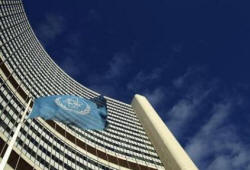|
 U.N.
nuclear watchdog pushes for headway in Iran inquiry: diplomats U.N.
nuclear watchdog pushes for headway in Iran inquiry: diplomats
 Send a link to a friend
Send a link to a friend
[October 02, 2014]
By Fredrik Dahl
VIENNA (Reuters) - The U.N. nuclear agency
is expected to make a new attempt soon to advance its investigation into
suspected atomic bomb research by Iran, diplomats said on Thursday, more
than a month after Tehran missed a deadline for cooperation.
|
|
 They said experts of the International Atomic Energy Agency and
Iran may meet early next week in Tehran, with the IAEA seeking to
achieve progress in the slow-moving inquiry into the country's
nuclear program. They said experts of the International Atomic Energy Agency and
Iran may meet early next week in Tehran, with the IAEA seeking to
achieve progress in the slow-moving inquiry into the country's
nuclear program.
There was no immediate comment from the IAEA, a Vienna-based U.N.
agency which for years has been trying to investigate Western
allegations that Iran has worked on designing a nuclear warhead.
Iran says its nuclear program is entirely peaceful.
Western officials say Iran must step up cooperation with the IAEA if
it wants to reach a broader diplomatic deal with world powers that
would end a decade-old nuclear dispute and gradually end crippling
financial and other sanctions on the oil producer.
Early last month, the IAEA said Iran had failed to answer questions
by an agreed Aug. 25 deadline about two areas of the investigation
into alleged research activities that could be applicable to any
attempt to make nuclear bombs - explosives testing and neutron
calculations.

While rejecting the accusations as baseless, Iran has promised since
Hassan Rouhani, seen as a pragmatist, became president last year on
a platform to end its international isolation, to work with the IAEA
to clear up the suspicions.
Rouhani's election raised hopes of a solution to the stand-off with
the West after years of rising tension and fears of a new Middle
East war. An interim accord was reached between Iran and six major
powers - the United States, France, Germany, Britain, China and
Russia - in Geneva last November.
But they did not meet a self-imposed July target date for a
long-term accord and now face a new deadline of Nov. 24. Both sides
said little headway was made in overcoming significant disagreements
at the most recent round of talks that ended on Friday in New York.
[to top of second column]
|

While the powers seek to limit the size of Iran's future nuclear
program - and thereby extend the time it would need for any bid to
amass fissile material for a weapon - the IAEA is investigating
alleged research and experiments in the past that could be used to
make the bomb itself.
Western officials say that although there is no chance of the IAEA
inquiry being completed before the scheduled end of the six-power
talks, some of the sanctions relief Iran is seeking would probably
depend on its cooperation with the U.N. agency.
The IAEA published a report in 2011 with intelligence indicating
Iran had a nuclear weapons research program that was halted in 2003
when it came under increased international pressure, given the
U.S.-led invasion of neighboring Iraq that same year and the
exposure in 2002 by Iranian exiles of its underground enrichment
plant at Natanz.
The intelligence suggested some activities may have resumed later.
The report identified about 12 specific areas that it said needed
clarification.
(Editing by Mark Heinrich)
[© 2014 Thomson Reuters. All rights
reserved.] Copyright 2014 Reuters. All rights reserved. This material may not be published,
broadcast, rewritten or redistributed.
 |